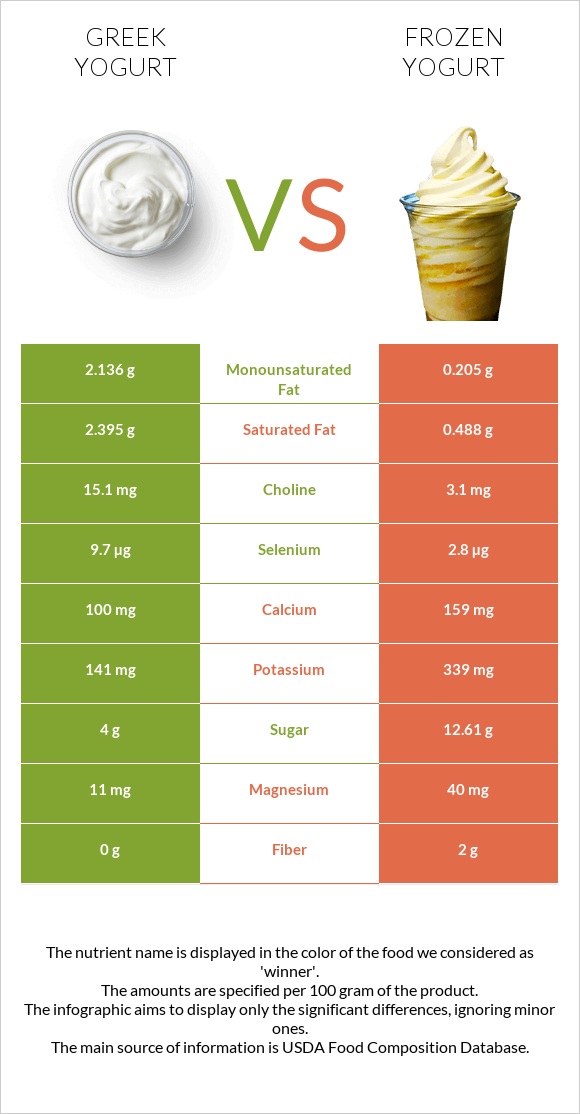Greek yogurt vs. Frozen yogurt — In-Depth Nutrition Comparison
Compare
How are Greek yogurt and frozen yogurt different?
- Greek yogurt is richer in selenium, vitamin B12, and vitamin B2, while frozen yogurt is higher in copper, fiber, magnesium, calcium, and potassium.
- Frozen yogurt covers your daily need for copper, 21% more than Greek yogurt.
- Greek yogurt contains 5 times more saturated fat than frozen yogurt. Greek yogurt contains 2.395g of saturated fat, while frozen yogurt contains 0.488g.
- Frozen yogurt has a higher glycemic index (51) than Greek yogurt (12).
Yogurt, Greek, plain, whole milk and Yogurt, frozen, flavors not chocolate, nonfat milk, with low-calorie sweetener types were used in this article.
Infographic

Infographic link
Mineral Comparison
Mineral comparison score is based on the number of minerals by which one or the other food is richer. The "coverage" charts below show how much of the daily needs can be covered by 300 grams of the food.
| Contains less SodiumSodium | -56.8% |
| Contains more ManganeseManganese | +∞% |
| Contains more SeleniumSelenium | +246.4% |
| Contains more MagnesiumMagnesium | +263.6% |
| Contains more CalciumCalcium | +59% |
| Contains more PotassiumPotassium | +140.4% |
| Contains more IronIron | +∞% |
| Contains more CopperCopper | +1094.1% |
Vitamin Comparison
Vitamin comparison score is based on the number of vitamins by which one or the other food is richer. The "coverage" charts below show how much of the daily needs can be covered by 300 grams of the food.
| Contains more Vitamin B2Vitamin B2 | +54.4% |
| Contains more Vitamin B5Vitamin B5 | +∞% |
| Contains more Vitamin B6Vitamin B6 | +57.5% |
| Contains more Vitamin B12Vitamin B12 | +53.1% |
| Contains more Vitamin CVitamin C | +∞% |
| Contains more Vitamin EVitamin E | +700% |
| Contains more Vitamin B1Vitamin B1 | +73.9% |
| Contains more Vitamin KVitamin K | +∞% |
| Contains more FolateFolate | +140% |
All nutrients comparison - raw data values
| Nutrient |  |
 |
DV% diff. |
| Copper | 0.017mg | 0.203mg | 21% |
| Selenium | 9.7µg | 2.8µg | 13% |
| Vitamin B12 | 0.75µg | 0.49µg | 11% |
| Protein | 9g | 4.4g | 9% |
| Saturated fat | 2.395g | 0.488g | 9% |
| Fiber | 0g | 2g | 8% |
| Vitamin B2 | 0.278mg | 0.18mg | 8% |
| Magnesium | 11mg | 40mg | 7% |
| Vitamin B5 | 0.331mg | 7% | |
| Fats | 5g | 0.8g | 6% |
| Calcium | 100mg | 159mg | 6% |
| Potassium | 141mg | 339mg | 6% |
| Carbs | 3.98g | 19.7g | 5% |
| Monounsaturated fat | 2.136g | 0.205g | 5% |
| Cholesterol | 13mg | 4mg | 3% |
| Polyunsaturated fat | 0.469g | 0.03g | 3% |
| Sodium | 35mg | 81mg | 2% |
| Vitamin B6 | 0.063mg | 0.04mg | 2% |
| Folate | 5µg | 12µg | 2% |
| Choline | 15.1mg | 3.1mg | 2% |
| Vitamin C | 0mg | 0.7mg | 1% |
| Iron | 0mg | 0.04mg | 1% |
| Phosphorus | 135mg | 129mg | 1% |
| Vitamin B1 | 0.023mg | 0.04mg | 1% |
| Calories | 97kcal | 104kcal | 0% |
| Net carbs | 3.98g | 17.7g | N/A |
| Sugar | 4g | 12.61g | N/A |
| Zinc | 0.52mg | 0.49mg | 0% |
| Vitamin A | 2µg | 2µg | 0% |
| Vitamin E | 0.01mg | 0.08mg | 0% |
| Manganese | 0.009mg | 0% | |
| Vitamin B3 | 0.208mg | 0.2mg | 0% |
| Vitamin K | 0µg | 0.3µg | 0% |
| Omega-3 - DHA | 0.004g | 0g | N/A |
| Omega-3 - ALA | 0.023g | N/A | |
| Omega-6 - Linoleic acid | 0.209g | N/A |
Macronutrient Comparison
Macronutrient breakdown side-by-side comparison
Protein:
9 g
Fats:
5 g
Carbs:
3.98 g
Water:
81.3 g
Other:
0.72 g
Protein:
4.4 g
Fats:
0.8 g
Carbs:
19.7 g
Water:
73.5 g
Other:
1.6 g
| Contains more ProteinProtein | +104.5% |
| Contains more FatsFats | +525% |
| Contains more CarbsCarbs | +395% |
| Contains more OtherOther | +122.2% |
~equal in
Water
~73.5g
Fat Type Comparison
Fat type breakdown side-by-side comparison
Saturated fat:
Sat. Fat
2.395 g
Monounsaturated fat:
Mono. Fat
2.136 g
Polyunsaturated fat:
Poly. Fat
0.469 g
Saturated fat:
Sat. Fat
0.488 g
Monounsaturated fat:
Mono. Fat
0.205 g
Polyunsaturated fat:
Poly. Fat
0.03 g
| Contains more Mono. FatMonounsaturated fat | +942% |
| Contains more Poly. FatPolyunsaturated fat | +1463.3% |
| Contains less Sat. FatSaturated fat | -79.6% |